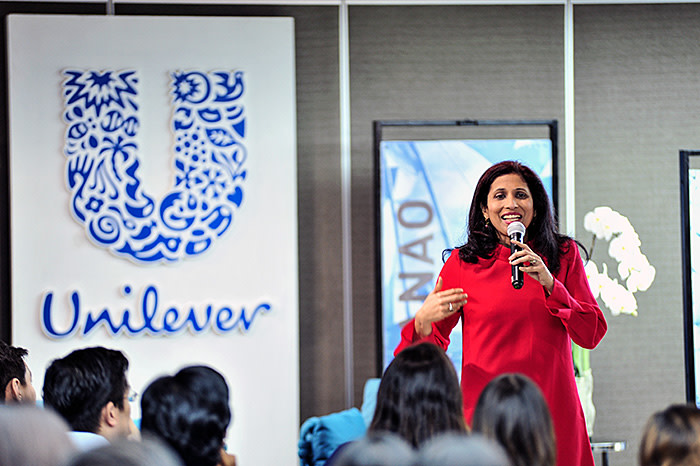Six rules for harnessing the power of a mentor

Roula Khalaf, Editor of the FT, selects her favourite stories in this weekly newsletter.
Claudine Adeyemi has never formally asked anyone to be her mentor and yet has ended up with several. The 27-year-old associate at London law firm Mishcon de Reya remembers when she was starting her legal career: “I had an overwhelming feeling that I just wasn’t going to fit in because of the industry, and I come from a different background.” State-school educated, she had commuted to lectures at university in London from the local authority flat she moved to after her mother’s death. “My mentor at the time gave me guidance and encouraged me to be myself.
“Having someone in your corner [who] . . . is prepared to give you that guidance to get there can have a huge impact on your career.”
Young women looking to progress at work often hear they should “get a mentor” — typically someone in a senior role who will provide guidance and support.
Leena Nair, chief human resources officer at Unilever, says it is crucial to have a mentor early on: as well as encouraging ambition, they often give access to a wider range of contacts .
“Being able to tap into that network of expertise and support is invaluable, particularly in organisational cultures where women might not have the same opportunities as men to expand their networks,” she says.
At Unilever, she notes, “women who are mentored have a higher chance of being appointed into senior roles”.

Many companies have their own mentoring programmes. However, when this is not an option — and sometimes even if it is — what are the best ways to find a suitable mentor and how should a mentorship work?
1. Understand why you want a mentor
“Asking someone outright, ‘will you be my mentor?’ is a bit premature,” says Ms Adeyemi. “It should start with you seeking advice from that person. If your ‘ask’ is clear, then any potential mentor can determine whether they can help you in the first place and if they have the time.”
Although mentorships are often about the job, their scope can be wider. “I’ve been told off by my mentors in the past about overworking and burning out,” says Ms Adeyemi.
Ms Nair says women tend to focus on personal challenges, such as building their confidence, but “they shouldn’t lose sight of how a mentor can help them build their business skills, too”.
2. Cast your net wide to find a good match
“Do your research on your potential mentor, understand what common ground you have and what you might learn from this individual,” says Kim Sgarlata, a partner at London-based consultancy, Capco.
Joseph Askham, a solicitor at a financial services company who mentors a female trainee, suggests looking outside your natural reporting lines and business area to achieve a different perspective. “Pick someone that you like. You might be spending a fair amount of time with them.”
Not every mentor needs to be senior: consider people one or two levels above you, as they may have most insight into the challenges you face.
3. Build a strong social media profile and use it
The right social media presence can help you to link up with the right potential mentors. Anyone can look at your profile, so keep it professional.
Rhonda Vetere, who has just left her job as chief technology officer at Estée Lauder, the international cosmetics company, to become president of data and analytics at healthcare technology company nThrive, says young women who have approached her for mentorship through social media have been “fabulous at follow-up and take it seriously”. You must show your mentor that you are acting on their advice.
Ms Adeyemi was referred to one mentor via a contact on LinkedIn and she met a current mentor, a female senior lawyer, at an awards event, having already been in contact via social media, including retweeting online. “It was that magic moment when you meet someone finally in person and we stayed in touch,” she says.
4. Be proactive . . . and do not forget to follow up
“At the start of building a mentoring relationship, the onus should fall on you to arrange meetings, follow up and give feedback on how you are following your mentor’s advice,” says Ms Adeyemi.
Although Mr Askham’s mentorship was set up by the company, he says: “My mentee took a very proactive role. She tends to organise our catch-ups and decides what it is we should focus on and what she wants from me.”
They meet once a week for coffee or a walk. “She is coming up to qualification, which can be an exciting but stressful time. Having been through that myself, I share my experiences and we talk about the challenges.”
Ms Vetere meets her mentees fortnightly over lunch and keeps it structured: “I outline goals and next steps for their career, along with advice,” she says. When considering potential candidates for mentoring, she looks for “a goal setter, who asks a lot of questions, is ambitious, listens and has other focuses outside work”.
5. Next step: find a sponsor
In addition to guidance from a mentor, young women may want a sponsor — a senior person who will advocate for you within the organisation.
Ms Adeyemi says this is important in the move towards middle management, but the relationship is different from mentoring: “You need your sponsor to buy into you and your potential. It’s not pouring your heart out and getting advice . . . there is a bigger focus on getting the tools to improve certain things so you can get to the next level.”
6. Remember that your mentor is learning, too
“I’ve gained more sometimes from being a mentor than I have as someone being mentored. It gives you a new perspective,” says Ms Nair. “For men mentoring women, it can be particularly useful, providing an insight into the challenges that women might be facing.”
She adds: “The key thing to remember is that mentors want to be successful. So make their investment in you count.”
Men mentoring women — a change of dynamics
In February, LeanIn.org launched a campaign to encourage senior men to mentor women. This came after its study — published with Survey Monkey, the online polling company — revealed a backlash against the #MeToo movement targeting sexual harassment.
It found that the number of male managers who said they were uncomfortable mentoring women had more than tripled to 16 per cent.
“We are at a pivotal moment for gender equality in the workplace and we need to see more men working with, and mentoring, women across the board,” says Ms Nair.
This story has been ammended to clarify Ms Vetere’s title as president of data and analytics.
Comments